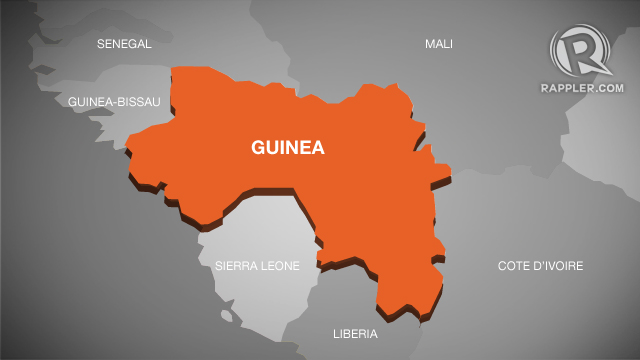SUMMARY
This is AI generated summarization, which may have errors. For context, always refer to the full article.

CONAKRY, Guinea – Aid workers and public health officials battled Monday, March 24 to contain west Africa’s first outbreak of the deadly Ebola virus as tests on suspected cases in Conakry allayed fears that it had spread to the capital.
At least 59 people have died in an outbreak of the virulent virus raging through Guinea’s southern forests but tests on 3 haemorrhagic fever cases — two of them fatal — in Conakry were negative, the government said.
“The Pasteur Institute in Dakar worked urgently all last night on samples taken from suspected cases here in Conakry, which were all negative,” said Sakoba Keita, the health ministry’s chief disease prevention officer.
“So for now, there’s no Ebola in Conakry, but haemorrhagic fever whose nature remains to be determined.”
The UN Children’s Fund (UNICEF) said in a statement on Sunday that the Ebola virus “has quickly spread from the communities of Macenta, Gueckedou, and Kissidougou to the capital, Conakry.”
Keita said however that the Pasteur Institute was still working on identifying the virus behind the fever cases in the capital and would know more “in the coming hours”.
Officials from the health ministry and the World Health Organization (WHO) met on Sunday in Conakry for urgent talks on the crisis.
“From January to March 23 Guinea has recorded a total of 87 suspected cases of viral haemorrhagic fever, including 61 deaths,” they said in a statement on Monday, indicating that most cases had been reported in the south of the west African country.
Virus overwhelms immune system
The first analyses of samples conducted by the Pasteur Institute in the French city of Lyon showed that cases in southern Guinea were due to the Ebola virus.
To date, no treatment or vaccine is available for Ebola, which kills between 25 and 90% of those who fall sick, depending on the strain of the virus, according to the World Health Organization (WHO).
The disease is transmitted by direct contact with blood, feces or sweat, or by sexual contact and the unprotected handling of contaminated corpses.
UNICEF said on Sunday, March 23 at least 3 victims of the outbreak were children and 8 health workers had been among the first to die after treating infected patients.
The organization urged Guineans not to attend funerals wherever possible and to avoid all contact with the sick and the dead.
Ebola, one of the world’s most virulent diseases, was first discovered in the Democratic Republic of Congo (DRC) in 1976. The central African country has suffered 8 outbreaks.
The most recent epidemic, also in the DRC, infected 62 people and left 34 dead between May and November 2012, according to the country’s health ministry.
Although there have also been outbreaks among humans in Uganda, the Republic of Congo and Gabon, the disease had never before been detected in people in west Africa.
According to researchers, the virus multiplies quickly, overwhelming the immune system’s ability to fight the infection.
‘Serious risk of spreading’
Aid organization Plan International warned that the epidemic risked spreading to neighboring countries because of the free movement of people across borders.
“Communities, especially children, in the border areas between Guinea, Liberia and Sierra Leone are vulnerable and need immediate support. A large-scale preventive action will need to be put in place rapidly,” Ibrahima Toure, Plan’s country director in Guinea, said in a statement.
Guinea’s health ministry said it was offering free treatment in isolation centers and raising awareness through all the media of good hygiene, while tracking people who may have been in contact with the infected.
Doctors Without Borders (MSF) and WHO teams already on the ground are being strengthened to help the government and distribute sanitation kits and protective equipment in the affected areas.
Meanwhile, experts in haemorrhagic fevers were expected from Dakar and Lyon to help in the quick identification of further samples.
Neighbouring Senegal and Ivory Coast have reactivated their epidemiological surveillance systems while the French embassy in Liberia has warned its nationals to avoid travel to southern Guinea.
Sierra Leone’s chief medical officer Brima Kargbo said there were no suspected cases in the country but added that medical teams had been sent to areas bordering Guinea to look for unusual cases of fever.
Local aid organization the Health For All Coalition warned that while no Ebola cases had yet been reported, “the tendency of its transmission remains high” in the border areas.
“People, goods and animals — such as sheep, goats and cows used in Sierra Leone — come from Guinea and it is these districts that they are brought into. And in these areas, people hunt for birds, monkeys and baboons for food.” – Rappler.com
Add a comment
How does this make you feel?
There are no comments yet. Add your comment to start the conversation.